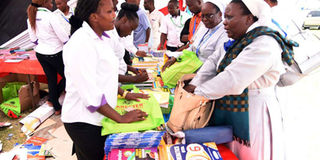Education ministry to save 13bn in textbooks plan

Teachers buy textbooks at the Sheikh Zayed Children Welfare Centre in Mombasa as the 13th Kenya Primary Schools Head Teachers Association Annual Delegates Conference came to a close on December 7, 2017. PHOTO | KEVIN ODIT | NATION MEDIA GROUP.
What you need to know:
Education ministry calculations show that the programme to start in January next year will cost Sh7.5 billion, down from Sh21.4 billion currently.
For instance a mathematic book that goes for Sh643.80 will now be sold at Sh273, a difference of Sh370.
According to the report, all, 13 publishers whose books were in the Orange Book were asked to submit bids for their textbooks to be revaluated through restricted tendering.
The new government plan to supply textbooks to schools in January will save the taxpayer Sh13.8 billion dealing a blow to cartels that had dominated the sector.
Education ministry calculations show that the programme to start in January next year will cost Sh7.5 billion, down from Sh21.4 billion currently.
The current costs are based on the approved text book list, which is called the Orange Book.
A report of the re-tendering conducted by the Kenya Institute of Curriculum Development shows that Orange Book prices are way higher than actual costs.
The report is titled, Re-Evaluation of School Textbooks (Classes 7 & 8 and Forms 1 – 4, states that the government will supply books directly to 28,000 public schools public primary schools and 7,000 secondary institutions.
PHYSICS
For instance a mathematic book that goes for Sh643.80 will now be sold at Sh273, a difference of Sh370. Progressive primary mathematic book 7 which used to cost Sh638 will now go for Sh310. A Form Four Moran secondary physics book going at Sh493 in the Orange Book, will now cost Sh217.
Every learner will receive a copy of the learner’s book for each subject under the programme.
And each primary school will receive five copies of the teacher’s guide for each subject while every secondary school will receive 10 copies of the teacher’s guide for each subject.
If the government bought these books at the current orange book price, inclusive of Value Added Tax, it would cost Sh21.4 billion, the report says.
It adds that buying the same books at the revaluated bid price will cost the government Sh7.6 billion.
NEXT MONTH
According to the report, all, 13 publishers whose books were in the Orange Book were asked to submit bids for their textbooks to be revaluated through restricted tendering. The publishers were asked to submit bids for Standard Seven and Eight and Form One to Four.
“The best and lowest priced book was selected for each subject per class from the books submitted,” the report says.
Form One students who will report to school between January 9 and January 12 will be issued with six textbooks — for mathematics, English, chemistry, physics, biology and Kiswahili.
According to Education Cabinet Secretary Fred Matiang’i, the government is determined to facilitate the distribution of textbooks directly to schools, effective next month.
This means schools will no longer get the cash earmarked for textbooks as has been the case since the introduction of Free Primary and Free Day Secondary Education programmes in 2003 and 2008 respectively.
Dr Matiang’i said new policy will ensure that all public primary and secondary schools get the instructional materials necessary for effective teaching and learning.
SH300 BILLION
He said the government had spent Sh300 billion in capitation under the Free Primary and Free Day Secondary education programmes.
Dr Matiang’i, however, expressed concern that most schools had not attained the 1:1 learner to textbook ratio, denying learners instructional materials which are important for improving learning outcomes.
However, the Kenya National Union of Teachers and the Kenya Booksellers and Stationers Association have opposed the move.
Knut Secretary General Wilson Sossion want more consultations.
“”Under International Labour Law recommendation number 60 on the intellectual right of teachers, one such right is to choose textbooks to use in class. No one should choose a textbook for you. Who is this through national procurement with capacity and intellect to choose one book for all classrooms in the republic of Kenya?” asked Mr Sossion.
SCANDAL
He termed the new directive a major scandal in the offing, insisting that the right to choose books should be left to teacher.
“Because of corruption at the Ministry of Education, we have got data and facts on literally everything. Give the teachers the list.
“The ministry cannot and can never procure. It is not their jurisdiction. To retain professionalism in the teacher it is my right to choose Oxford or KLB to teach my chemistry class,” he said.
The booksellers’ national vice chairman Patrick Matindi urged Dr Matiang’i to give them three years to sell their stock. “This is witch-hunt. Booksellers are just like any other businessmen,” he said.
Last year, a report by Ethics and Anti-Corruption Commission (EACC) unearthed massive irregularities in the procurement of textbooks for public schools, with headteachers playing a key role in the racket.
PUPIL RATIO
The fraud ranged from forged signatures, delivery of phantom books, overpricing and single-sourcing of suppliers by instructional materials selection committees at the school level.
The confidential report by the Commission — Examination into the Disbursement and Utilisation of Free Primary Education Funds — blamed the roles played by heads, school management committees and suppliers for the failure to achieve the 1:1 book-to-pupil ratio.
It was estimated that the pupil-to-book ratio stood at 5:1 in primary schools against the government target of 1:1
The EACC report showed that there were cases where the signatures of committee members, chairmen and parents’ representatives in the minute books were different from those in the order forms.
“In other cases, the team was informed that only the headteacher signed order forms issued to suppliers,” the report added.





